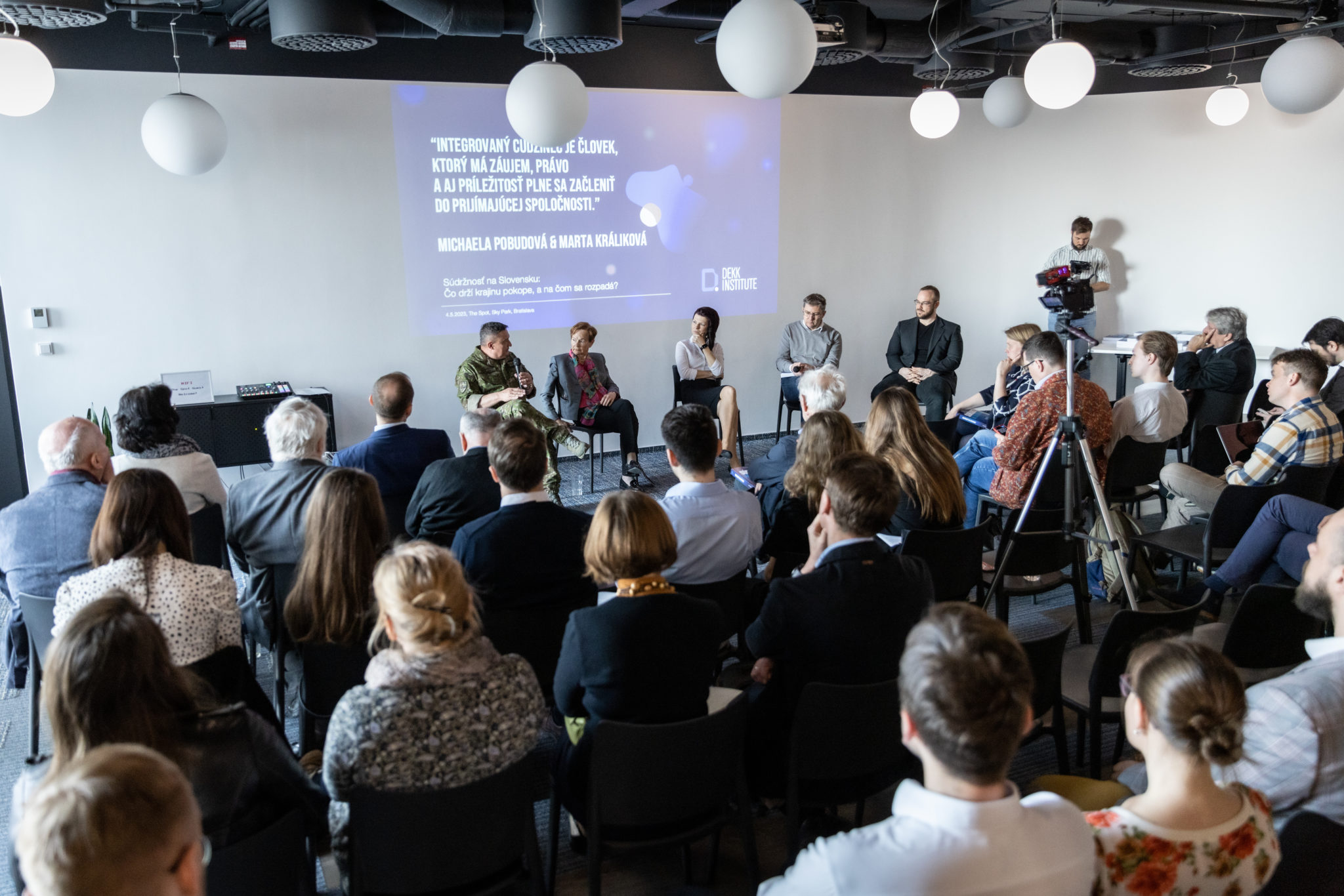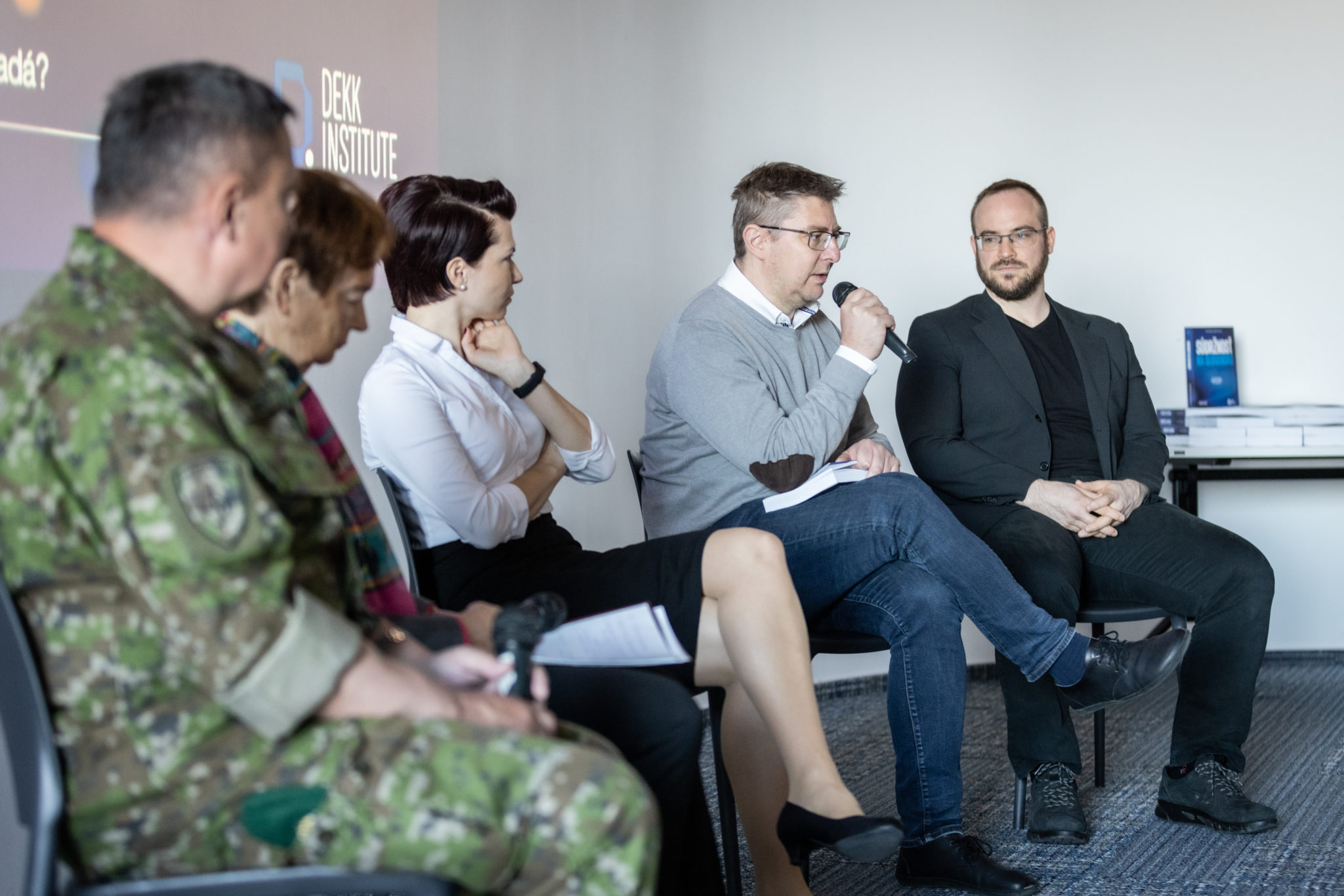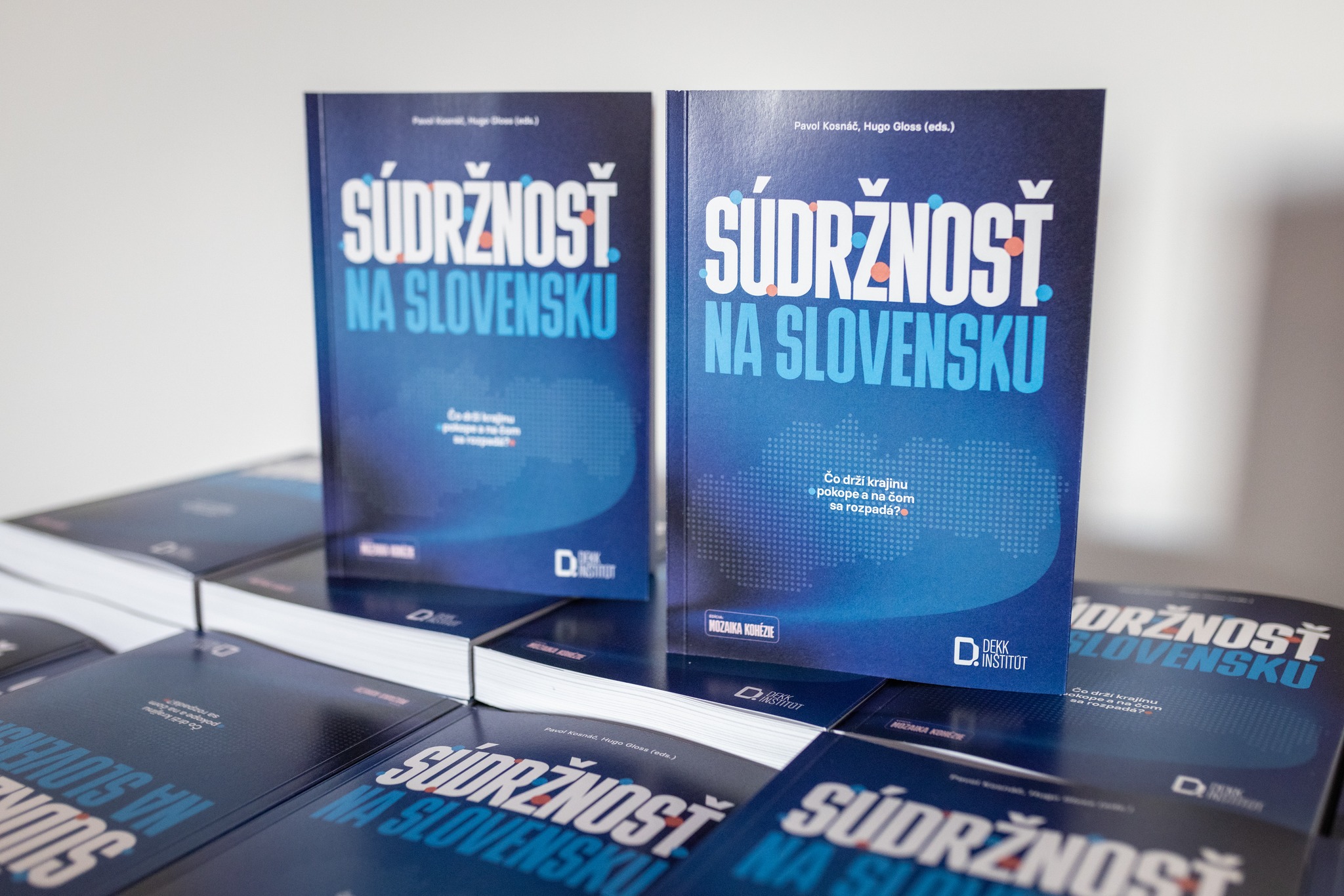
Cieľom knihy Súdržnosť na Slovensku: Čo drží krajinu pokope a na čom sa rozpadá? je otvoriť na Slovensku diskusiu o témach dôvery, patriotizmu a spoločenskej súdržnosti v našej krajine. Kniha chce slúžiť všetkým, ktorí vnímajú tému súdržnosti v našej spoločnosti ako dôležitú: rôznym útvarom štátnej správy, policy-makerom, akadémii, médiám aj širšej občianskej spoločnosti.
Aktuálne sme spustili crowdfundingovú kampaň na prvú knihu z edície Mozaika kohézie. Čo v knihe nájdete?
Dohromady 16 príspevkov od 20 autorov na 367 stranách pútavého textu.
Medzi expertami, ktorí do knihy prispeli, sú 13 vedci zo slovenských univerzít, Slovenskej akadémie vied, Univerzity Karlovej v Prahe, University of Cambridge v UK a University of Agder v Nórsku a 7 takzvaných „experts by experience“, teda odborníkov, ktorí z povahy svojho praktického zamestnania – napríklad integrácia cudzincov, dizajnovanie estónskeho plánu kolektívnej identity, decentralizácia štátu alebo velenie Ozbrojeným silám SR – majú vhľad do problematiky týkajúcej sa spoločenskej kohézie a dôvery.
Vo štvrtok 4. mája sme knihu predstavili verejnosti. Všetky dostupné výtlačky sa v okamihu rozobrali. Akcia bola veľmi príjemná. Bolo radosťou sledovať, ako sa rôzne svety i generácie na mieste konštruktívne prelínajú a spoločne živo diskutujú. Vzťah ku krajine zrejme spája

Trendy (ne)dôvery na Slovensku
Pavol Kosnáč, DEKK Inštitút a Karlova univerzita
Hugo Gloss, DEKK Inštitút a Karlova univerzita
Sociálna kohézia v sociologickej a psychologickej perspektíve
Justin E. Lane, CulturePulse
LeRon Shults, University of Agder
Emócie a spoločenská súdržnosť
Samuel Žilinčík, Masarykova Univerzita, víťaz prestížnej britskej súťaže Royal United Services Institute
Dôvera ako základný pilier sociálnej súdržnosti
Marianna Mrva, Sociologický ústav SAV
Roman Džambazovič, Filozofická fakulta UK
Sociálna kohézia na Slovensku z pohľadu historika
Roman Holec, Historický ústav SAV
Sociálna kohézia a nacionalizmus
Ladislav (László) Vörös, Historický ústav SAV
Spoločenská súdržnosť na Slovensku počas modernizácie a úloha spolkov
Elena Mannová, Historický ústav SAV
Správa o stave kohézie na Slovensku
Marína Zavacká, Historický ústav SAV
Elity a sociálna kohézia na Slovensku
Soňa Szomolányi, Filozofická fakulta UK
Katolíci a sociálna kohézia na Slovensku: Historická (seba)viktimizácia a historická (seba)reflexia
Agáta Šústová Drelová, Historický ústav SAV
Historické korene slovenskej rusofílie, jej dôsledky a možné riešenia
Daniel Šmihula, diplomat a politológ
Cesta k sociálnej súdržnosti: Estónska skúsenosť
Marianna Makarova, Poradkyňa Úradu vlády Estónska pre strategickú komunikáciu
Spravovanie štátu a sociálna súdržnosť
Viktor Nižňanský, Komunálne výskumné a poradenské centrum, n. o.
Integrácia cudzincov a cudziniek po slovensky
Michaela Pobudová, MAREENA, o. z.
Marta Králiková, MAREENA, o. z.
Prierez vývojom dôvery k vláde na Slovensku v rokoch 1990 až 2023
Martin Slosiarik, Agentúra FOCUS
Je Slovensko zraniteľné? Armáda a patriotizmus
gen. Daniel Zmeko, Náčelník Generálneho štábu Ozbrojených síl SR

© 2024 DEKK Inštitút | All rights reserved | CREA:THINK STUDIO
Michaela is currently finishing her bachelor's degree in psychology at the Faculty of Philosophy of the Comenius University in Bratislava. In psychology, neurocognitive topics, psychosomatics, identity building and community building are close to her heart. While still in grammar school, she was mentored by neuroscientist Dominika Fričová, who is dedicated to researching neurodegenerative diseases - in this topic, Michaela continues today in her current work under the guidance of neuropsychologist Petra Brandoburová in the Neuropsy laboratory.
Together with our research intern Filip, they managed to succeed at the international level of the ŠVOK (Student Scientific and Professional Conference).
At DEKK, she is currently processing statistics on the family behavior of the Slovak population. She is fascinated byobserving the life of diverse communities and their impact on the individual - from the Roma community, which is at the margins of society, where she volunteered, to the community of purposeful young people who yearn for knowledge at the Anton Neuwirth College, where Michaela completed her university program.
She likes to devote her free time to organizing events that contribute to a better society. She also enjoys a good psychology book, English classics, or time with friends.
Michaela je aktuálne v závere bakalárskeho stupňa v odbore psychológia na Filozofickej fakulte UK. Z psychológie sú jej blízke neurokognitívne témy, psychosomatika, budovanie identity a budovanie komunít. Ešte v čase gymnázia ju mentorovala neurovedkyňa Dominika Fričová, ktorá sa venuje výskumu neurodegeneratívnych ochorení - v tejto téme Michaela pokračuje aj dnes vo svojej súčasnej práci pod vedením neuropsychologičky Petry Brandoburovej v laboratóriu Neuropsy.
Spolu s našim výskumným stážistom Filipom sa im podarilo uspieť na medzinárodnej úrovni študentskej súťaže ŠVOK (Študentská vedecká a odborná konferencia).
V DEKKu sa v súčasnosti venuje spracovaniu štatistiky o rodinnom správaní slovenskej populácie. Fascinuje ju sledovať život rôznorodých komunít a ich vplyv na jednotlivca - od rómskej komunity, ktorá je na chvoste spoločnosti, kde dobrovoľníčila, až po komunitu cieľavedomých mladých v Kolégiu Antona Neuwirtha, ktorí túžia po poznaní, kde Michaela absolvovala vysokoškolský program.
Voľný čas rada venuje organizácii podujatí, ktoré prispievajú k lepšej spoločnosti, knihe od dobrého psychológa, či anglickej klasike alebo ho rada strávi s priateľmi.
Filip is in charge of working with psychological resources at DEKK.
After completing his undergraduate studies in psychology at Comenius University, he went to Utrecht University to gain study experience, but left after a period of time due to unfulfilled expectations. At the same time, he is a graduate of the two-year programme of the Anton Neuwirth College. It was there that he first encountered Aristotle and his idea that everything living in the world has a natural goal towards which it is directed: to prosper.
So he began to ask himself the question: if all beings have a goal deeply rooted in their nature, why do humans go against it and engage in destructive behavior? He sees in DEKK the hope of exploring part of this question, i.e., why societies fall apart. In addition, he is also interested in the individual dimension of this question: why do some individuals' lives fall apart? For this reason he has been involved in social assistance to homeless people in various low threshold centres in Bratislava or Brno.
In the past, he has organised several discussions with public figures, journalists and statesmen and also won the national competition ŠVOK in the category Psychology with his research.
In his free time he likes to read newspapers, listen to the Red Hot Chilli Peppers or sit in the city for a coffee.
Paulína is studying at the Bratislava International School of Liberal Studies on a bachelor's degree and at the same time she is studying in the Nexteria Leadership Academy 3-year development program, where she develops her soft skills and organizes community activities.
In the past, she worked on projects for Microsoft, Tatra banka, Slido and the city of Trenčín.
She likes to think about why society is the way it is. Her passion is psychology, informal education and self-development.
Michal Gačko is a graduate of the Faculty of Electrical Engineering and Informatics at the Slovak Technical University in the field of applied informatics. He studied for one semester in Norway at the Norwegian University of Science and Technology as part of the Erasmus program. He has experience in the design, implementation and management of various types of database systems, as well as in the design and implementation of architectural patterns and structures in software systems. In addition, it deals with data analysis and data visualization.
Veronika Cigáneková is an analyst focusing on public policies.
She graduated in philosophy from King’s College London, where she researched the connections between philosophy and public policy in the final stages of her studies. She later pursued a master’s degree in public policy at Sciences Po in Paris, with a focus on policy analysis, legislative development, and practical solutions. While in Paris, she also worked as an analyst at the OECD, specializing in public trust in institutions.
Currently, in addition to her work at DEKK, Veronika works alongside a member of the National Council of the Slovak Republic, focusing on culture and media.
Veronika has extensive experience in the non-profit sector, where she worked on themes such as civic participation, youth engagement, the development of social entrepreneurship, and the issue of the “brain drain” from Slovakia. Among her notable projects is the founding and two-year leadership of Nexteria Global HUB.
Hugo Gloss is the Chief Operating Officer (COO) of the DEKK Institute, responsible for the smooth running of the administration and is also responsible for the preparation and successful implementation of projects.
He studied International Relations and Diplomacy at the University of Bologna, Roma Tre University in Rome and completed a one-year training programme at the Anton Neuwirth College. He interned at the Representation Office of the Slovak Republic to the Holy See and at the Department of Communication and Prevention of the Presidium of the Police Force of the Slovak Republic. He worked at Accenture and coordinated humanitarian projects of the Caritas Slovakia in Iraq, Syria, Lebanon and Ukraine. As part of his work, he has visited countries where social cohesion is seriously weakened, and he is therefore concerned that Slovakia should not follow a similar path.
Since September 2024 he has been an internal PhD student at the Department of Sociology, Faculty of Arts, Comenius University in Bratislava. In his studies he focuses on researching the theory of social cohesion and developing an experimental model of its measurement and strengthening in Slovak society. He is married and has four children.
Pavol Kosnáč is the Scientific Director of the DEKK Institute and the Principal Investigator of the World Values Survey (WVS) program in Slovakia and the Czech Republic, which is covered by DEKK. He represents the DEKK Institute in the UNDP project analyzing social cohesion in Bosnia and Herzegovina. He is also the author of the program Slovakia in data, the aim of which is to accumulate and make available a database of complex social science data to the general and expert public.
During DEKK Institute's cooperation with Charles University in 2022-2023, he led a team of 9 scientists investigating the impact of social changes on the generational shift in values and social cohesion, applied for example in the analysis of the development of trust in governments in the V4 countries, the growing (un)willingness to defend the country or the impact of war on Ukrainian culture. During the same period, he was also a member of the advisory board of the Forgiveness and Future Building project at the University of Cambridge.
He studied comparative religious studies in Bratislava, Islam and philosophy of science at Oxford, and completed academic placements at the London School of Economics in London and Mahidol University in Bangkok. He received his doctorate in political science at Masaryk University in Brno.
He is interested in integration of field research methods, psychological and cognitive research tools, public opinion polls and big data. He specializes in the overlap between ideology, religion, violence and war. Experience from humanitarian and research projects in Central and Eastern Europe, the Middle East and India led him to try to understand the issues of complex systems, social cohesion and social stability.
He works as a consultant for humanitarian organizations and scientific workplaces in Great Britain, Ukraine, Iraq and Thailand. He is a registered (forensic) expert in the field of Social Sciences and Humanities in matters of religion at the Ministry of Justice of the Slovak Republic and represents the Slovak Republic in the World Association for Public Opinion Research (WAPOR) and the World Values Survey Association (WVSA). He is a member of the Slovak Society for the Study of Religions (SSŠN) in Bratislava, the Royal Anthropological Institute (RAI) in Great Britain, and a member of the advisory board of the Inform Institute at King's College London.